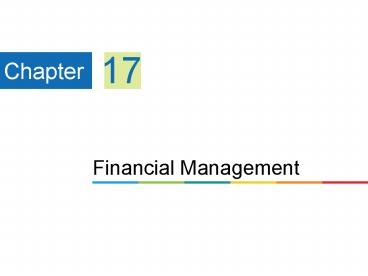Financial Management - PowerPoint PPT Presentation
1 / 18
Title:
Financial Management
Description:
17 Chapter Financial Management * * * * Define finance and explain the role of financial managers. Describe the components of a financial plan and the financial ... – PowerPoint PPT presentation
Number of Views:594
Avg rating:5.0/5.0
Title: Financial Management
1
Financial Management
17
Chapter
2
Learning Objectives
Define finance and explain the role of financial
managers. Describe the components of a financial
plan and the financial planning process. Outline
how organizations manage their assets. Compare
the two major sources of funds for a business,
and explain the concept of leverage.
Identify sources of short-term financing for
business operations. Discuss long-term financing
options. Describe mergers, acquisitions, buyouts,
and divestitures.
3
The Business Function of Finance
- Finance planning, obtaining, and managing the
companys funds in order to accomplish its
objectives - Maximizing overall worth
- Meeting expenses
- Investing in assets
- Increasing profits to shareholders
4
The Role of the Finance Manager
- Implement the firms financial plan
- Determine the most appropriate source of funds
- Many CFOs are members of the board of directors
5
Risk-Return Tradeoff
- The process of maximizing the wealth of the
firms shareholders by striking the optimal
balance between risk and return.
6
Financial Planning
- Financial Plan the inflows and outflows and
sources of funds. - Financial plans are built by answering the
following questions - What funds will the firm require during the
planning period? - When will it need additional funds?
- Where will it obtain the necessary funds?
- Financial plans are based on the forecasts of
costs and expected sales activities for a given
period.
7
Managing Assets
- Sound financial management requires assets to be
managed and acquired. - What a firm owns
- Use of funds
8
Short-Term Assets
- Cash
- Marketable Securities
- Accounts Receivable
- Inventory
9
Capital Investment Analysis
- Long-lived assets
- Produce economic benefit for more than one year
- Substantial investments
- Capital Investment Analysis
- Expansion new assets
- Replacement upgrading assets
10
Managing International Assets
- Todays firms have facilities and assets
worldwide. - Sales occur outside of the home country.
- International assets require the management of
activities to reduce the financial risk of
exchange rates. - Balance
11
Sources of Funds and Capital Structure
- Debt Capital funds obtained through borrowing.
- Equity Capital investment in the firm in
exchange for ownership.
12
Leverage and Capital Structure
- Goal increasing the rate of return on funds
invested by borrowing funds
13
Mixing Short and Long-Term Funds
- Short-term funds
- Current liabilities
- Less expensive
- Volatile interest rates
- Long-term funds
- Long-term debt and equity
- Used for long-term assets
14
Dividend Policy
- Dividends are cash payments to shareholders.
- Highest dividend yielding stocks
- Financial managers must make decisions regarding
their dividend policy. - Should we pay a dividend?
- When should it be paid?
15
Short-Term Funding Options
- Trade Credit
- Short-term Loans
- Commercial Paper
16
Sources of Long-Term Financing
- Public Sale of Stocks and Bonds
- Private Placements
- Venture Capitalists
- Private Equity Funds
- Hedge Funds
17
Mergers, Acquisitions, Buyouts, and Divestitures
- Financial managers evaluate mergers,
acquisitions, and other opportunities. - Leveraged buyouts
- Divestiture
- Sell-off/Spin-off
18































